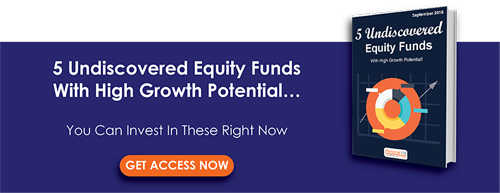How are you going to welcome the New Year?
Every New Year comes with new resolutions.
But how many of you have any resolution on the personal finance front?
Selecting the top mutual funds is a resolution worth considering.
As you must be aware, if you invest in diversified equity funds, they can multiply your wealth over the long-term.
So which mutual fund category looks promising for 2019?
If you are expecting a one-word straightforward answer, you are perhaps missing the bigger picture.
There’s nothing called the best category of a mutual fund for a particular year.
You should rather care about which category of mutual funds you will be comfortable with.
To answer this question, you need to ascertain:
Once you do the above, chart out an asset allocation prudently and then invest in
mutual funds.
[Read: Asset Allocation: Hocus-Pocus Or The Essence Of Successful Investing?]
The 10 key factors that will steer the performance of equity-oriented mutual funds in 2019 are:
-
Earnings growth of corporate Inc.
-
GDP growth
-
The budget 2019 announcements
-
The outcome of the Lok Sabha Elections
-
The direction in which international crude oil prices go
-
How the Indian rupee fares vis-à-vis the greenback
-
Inflation trajectory
-
Developments on the asset quality of banks and Non-Banking Financial Companies (NBFCs)
-
Impact of farm loan waiver, increased Minimum Support Prices (MSP), and Central Pay Commission (CPC) on the fiscal deficit; and
-
Global macroeconomic and geopolitical environment, especially on the back of escalated trade tensions between the U.S. and China
But many of the above factors affect the markets almost every year. So, should they scare you?
Please note, equity mutual funds are suitable only for long-term investments. And what happened in 2019 may not be relevant even in 2020. Hence, why take any investment decision just based on merely the outlook for 2019?
Never pick mutual fund scheme by:
-
Giving importance to the short-term market outlook
-
Ignoring your personalised asset allocation
-
Depending extensively on the past track-record of a scheme
-
Relying blindly on star-ratings
-
Disregarding qualitative aspects associated with mutual fund selection
-
Relying on the advice given by friends and relatives unqualified to give you advice on mutual funds
Speaking about selecting the top mutual funds for 2019, you must realise that comparing only historical returns won’t suffice.
If you recollect, SEBI’s (Securities and Exchange Board of India’s) re-categorisation norms have made historical returns less relevant for various mutual fund schemes. After which, the fund houses have extensively churned their portfolios to comply with new rules and the performance track record of many mutual fund schemes have become irrelevant or redundant.
[Read: Why You Should Stop Looking At Mutual Fund Star Ratings Now]
Here’s how you should select top mutual funds in 2019…

(Image source: freepik.com)
Quantitative Parameters:
-
Performance and risk analysis
This is to analyse if the fund has shown consistency in performance across various market periods with decent risk-adjusted returns. Under this, the fund needs to be ranked on quantitative parameters like rolling returns across short-term and long-term durations, such as 1-year, 3-year, and 5-year periods, and on risk-reward ratios like Sharpe Ratio, Sortino Ratio, and Standard Deviation over a 3-year period.
-
Performance across market cycles
You need to ensure that the fund has the ability to perform consistently across multiple market cycles i.e. bull and bear phases. Therefore, compare the performance of the schemes vis-à-vis their benchmark index across bull phases and bear market phases. A fund that performs well on both sides of the market should rank higher on the list.
Qualitative Parameters:
-
Portfolio Quality
The portfolio quality of a fund points at how it is likely to perform in the future. Here’s what you should pay attention to:
Adequate Diversification - The fund should not hold a highly concentrated portfolio. A concentrated portfolio heightens the risk involved. Hence, the portfolio of a fund should be well-diversified and the exposure to the top-10 stocks should be ideally under 50% while concentration to one particular sector should not exceed 30-35%.
Credit Quality - For debt portfolios, you need to ensure that the fund does not hold a high proportion of low-rated (securities rated AA or below) or unrated debt instruments. A fund with a higher credit quality should be ranked higher.
Low Churn - Engaging in high churning can result in trading and high turnover cost. Therefore, you also need to consider the portfolio turnover ratio and expenses and penalise funds involved in high churning, i.e. those funds with a turnover ratio of above 100%.
-
Quality of Fund Management
Further, consider the fund manager’s experience, his workload, consistency of the fund house in clocking returns, and proportion of the AUM (Assets Under Management) of the fund house actually performing. Therefore, check -
The fund manager’s work experience – He/she should have a decent experience in investment research and fund management, ideally over a decade. But also note that mere experience isn't enough. Some schemes managed by fund managers with 15-20 years of experience have never done consistently well for a long time.
The number of schemes managed – A fund manager usually manages multiple schemes. Thus, you need to check if the fund manager is not loaded with a large number of schemes. If he is managing more than five open-ended funds, it should raise a red flag.
The efficiency of the fund house in managing your money – You need to check if the fund house is consistent in performance across schemes or if only a few selected schemes are doing well. A fund house that performs well across the board is an indication of sound investment processes and risk management techniques in place.
Yes, we know that the above list is a lot for an average investor to look at. It involves a lot of number crunching and much of the data is not easily available in one place. But if you do need to narrow down on the top funds, these factors are of utmost importance.
To know more about selecting winning mutual funds, watch this short video:

PersonalFN adopts comprehensive mutual fund research process to select the best mutual funds. Based on a composite score, which has a weightage to each parameter, PersonalFN gives its views on each fund recommended under various mutual fund research services.
PS: If you wish to take a calculated risk and invest in equity funds, PersonalFN can help you pick hidden gems or lesser-known funds that are capable of generating big gains for you.
PersonalFN has released a report 5 Undiscovered Equity Funds especially for investors like you.
These undiscovered funds can help you counter inflation by a substantial margin. Subscribe today!

Add Comments